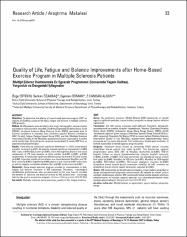| dc.contributor.author | Ertekin, Özge | |
| dc.contributor.author | Özakbaş, Serkan | |
| dc.contributor.author | İdiman, Egemen | |
| dc.contributor.author | Algün, Zehra Candan | |
| dc.date.accessioned | 10.07.201910:49:13 | |
| dc.date.accessioned | 2019-07-10T20:02:08Z | |
| dc.date.available | 10.07.201910:49:13 | |
| dc.date.available | 2019-07-10T20:02:08Z | |
| dc.date.issued | 2012 | en_US |
| dc.identifier.citation | Ertekin, Ö., Özakbaş, S.,Idiman, E. ve Candan A., Z.(2012). Quality of life, fatigue and balance improvements after home-based exercise program in multiple sclerosis patients. Archives of Neupopsychiatry, 49(1), 33-38. https://dx.doi.org/10.4274/npa.y6091 | en_US |
| dc.identifier.issn | 1300-0667 | |
| dc.identifier.uri | https://dx.doi.org/10.4274/npa.y6091 | |
| dc.identifier.uri | https://hdl.handle.net/20.500.12511/3561 | |
| dc.description | WOS: 000302187200006 | en_US |
| dc.description.abstract | Objectives: To determine the effects of home-based exercise program (HEP) on aspects of disability, quality of life (QoL), fatigue and balance in multiple sclerosis (MS) patients. Method: 40 MS patients were enrolled in the study. Demographic, socioeconomic and medical statuses were recorded. Disability [Expanded Disability Status Scale (EDSS)], functional balance [Berg Balance Scale (BBS)], perceived level of balance confidence in everyday tasks [Activities-specific Balance Confidence (ABC) Scale)], fatigue [Fatigue Impact Scale (FIS)], and QoL [Multiple Sclerosis International Quality of Life (MusiQoL) questionnaire] were assessed at baseline and 3 months later. All participants received standardized 12-weeks HEP from an experienced physiotherapist. Results: There were no statistically significant differences in EDSS scores before and after treatment (p=0.41). All patients showed significant improvement in BBS, ABC scale, and MusiQoL scores (p<0.001), and in the cognitive, physical and social components of FIS from baseline to three months (p=0.002, p=0.001, p=0.002, respectively). A statistically significant difference was not found in FIS-total scores (p=0.060). A positive significant correlation was found between MusiQoL and FIS-total scores (p<0.001), cognitive (p=0.004), physical and social (p<0.001) subscores; as well as negative correlation between QoL and ABC scale scores (p<0.001). Discussion: Home-based exercise program resulted in improvements in QoL, fatigue and balance functions in MS individuals. Therefore, neurological rehabilitation professionals, who are specialized on this area, have to consider the benefits of exercise and physical activity for MS patients and encourage them to take part in an exercise program. | en_US |
| dc.description.abstract | Amaç: Bu çalışmanın amaçları, Multipl Skleroz (MS) hastalarında ev temelli egzersiz eğitiminin yetiyitimi, yaşam kalitesi, yorgunluk ve denge üzerine etkilerini saptamaktır. Yöntemler: Kırk MS hastası çalışmaya dahil edilmiştir. Hastaların, demografik, sosyoekonomik ve medikal düzeyleri kaydedilmiştir. Yetiyitimi [Expanded Disability Status Scale (EDSS)], fonksiyonel denge [Berg Denge Skalası (BDS)], günlük aktivitelerde algılanan güven duygusu [Aktiviteye Spesifik Denge Güvenlik Skalası- ABC], yorgunluk [Yorgunluk Etki Skalası (YES)] ve yaşam kalitesi [Multiple Sclerosis International Quality of Life (MusiQoL) questionnaire] değerlendirmeleri tedavi öncesinde ve 3 ay sonra tekrarlandı. Tüm katılımcılara, fizyoterapist tarafından 12 haftalık standardize ev-temelli egzersiz programı verildi. Bulgular: Hastaların tedavi öncesi ve sonrasında EDSS skorları arasında istatistiksel olarak anlamlı fark yoktu (p=0,41). Tüm katılımcılar, egzersiz programından sonra BDS, ABC ve MusiQoL skorlarında (p<0,001), YES’nın kognitif, fiziksel ve sosyal komponentlerinde iyileşme kaydetti (sırasıyla, p=0,002, p=0,001, p=0,002). YES-total skorlarında ise istatistiksel olarak anlamlı fark yoktu (p=0,060). MusiQoL ile YES-total (p<0.001), MusiQoL ile YES-kognitif (p=0,004), YES-fiziksel (p<0,001), YES-sosyal altgrupları arasında (p<0,001) istatistiksel olarak anlamlı pozitif korelasyon; MusiQoL ile ABC arasında ise istatistiksel olarak anlamlı negatif korelasyon saptandı (p<0,001). Sonuç: MS hastalarında, ev-temelli egzersiz programı, yaşam kalitesi, yorgunluk ve denge fonksiyonlarında iyileşmeyle sonuçlanmıştır. Bu nedenle bu alanda çalışan nörolojik rehabilitasyon ekibinin, MS hastalarında fiziksel aktivite düzeyini artırmaya odaklanmasının ve hastaları egzersiz yapmaları için cesaretlendirilmesinin önem taşıdığını düşünmekteyiz. | en_US |
| dc.language.iso | eng | en_US |
| dc.publisher | Galenos Yayıncılık | en_US |
| dc.rights | info:eu-repo/semantics/openAccess | en_US |
| dc.subject | Multiple Sclerosis | en_US |
| dc.subject | Home Exercises | en_US |
| dc.subject | Quality of Life | en_US |
| dc.subject | Fatigue | en_US |
| dc.subject | Balance | en_US |
| dc.subject | Multipl Skleroz | en_US |
| dc.subject | Ev Egzersizleri | en_US |
| dc.subject | Yaşam Kalitesi | en_US |
| dc.subject | Yorgunluk | en_US |
| dc.subject | Denge | en_US |
| dc.title | Quality of life, fatigue and balance improvements after home-based exercise program in multiple sclerosis patients | en_US |
| dc.title.alternative | Multipl skleroz hastalarında ev egzersiz programının sonrasında yaşam kalitesi, yorgunluk ve dengedeki iyileşmeler | en_US |
| dc.type | article | en_US |
| dc.relation.ispartof | Archives of Neupopsychiatry | en_US |
| dc.department | İstanbul Medipol Üniversitesi, Sağlık Bilimleri Fakültesi, Fizyoterapi ve Rehabilitasyon Bölümü | en_US |
| dc.authorid | 0000-0002-2476-6567 | en_US |
| dc.identifier.volume | 49 | en_US |
| dc.identifier.issue | 1 | en_US |
| dc.identifier.startpage | 33 | en_US |
| dc.identifier.endpage | 38 | en_US |
| dc.relation.publicationcategory | Makale - Uluslararası Hakemli Dergi - Kurum Öğretim Elemanı | en_US |
| dc.identifier.doi | 10.4274/npa.y6091 | en_US |
| dc.identifier.wosquality | Q4 | en_US |
| dc.identifier.scopusquality | Q4 | en_US |


















